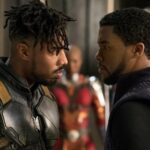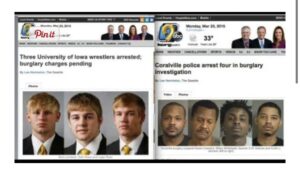My project researched African History’s miseducation and how it should be taught more often to avoid colonialism’s continuous interference in education. Concerning the Afro-American common Identity crisis during the Renaissance in support of Afrocentricity. Portrayed by written poems, audio, and a linked blog post.
There’s a massive issue regarding our American history interjecting with the topic of American enslavement. For students to understand American slavery, the black perspective must be taught with integrity and acceptance in our somewhat post-colonial era. We need to educate the miseducated by teaching the brutal American history to lessen the continuous interference of colonialism in education and the lives of people of color. In the article, “Why Can’t We Teach Slavery Right in American Schools?” Nikita Stewart admits that our country’s educational system has been unwilling to teach young children and teenagers about enslavement in America (Stewart). For years the U.S has been choosing not to educate students properly in K-12, which leads to a high percentage of college students not having the proper social studies education (Stewart). I choose this piece because it hits the main point of the overall project: the miseducation and how our history should be taught, not neglecting sources that reveal the truth no matter the audience’s age. Usually, in American history, what’s discussed about African American history are the excellent creative artist, writers, and great leaders.
Langston Hughes was known to be a great poet of the African Americans, especially during the Great Depression and Black Renaissance. The Renaissance was a time where writers, musicians, and artists of Harlem recreated the parameters of afro-American Aesthetics and creativity ( M&M 253 ). In the text, “Let Nobody Turn Us Around: An African American Anthology,” “ Langston Hughes and the Harlem Renaissance” piece, for example, there was always a “Mountain” that stand in the way of the true negro Art, “the desire to pour racial individuality into the mold of American standardization” (M&M 253 ). Hughes confesses the common issue in society that correlated with the identity crisis of an African American. I remember learning about Langston Hughes and how great of a writer he was but not until college I realized why he tried so hard to make the difference among his white oppressors and his fixed mentality. He noticed that Afro-American poets would desire to have an identity such as their oppressor by adopting the Euro-American writing style instead of embracing the Afro-American style.
Similarly, in the article, “Afrocentricity: Sustaining Africology: On the Creation and Development of a Discipline,” Molefi K. Asante encourages people to study Afrocentricity to develop an understanding of history through the black perspective. For instance, Asante raises an interesting question, “What would African people do if there were no white people?” (Asante), which means how would African people act, their attitude towards the environment, or their preference of color. Asante acknowledges that there’s a vast intervention in African American life: the oppression of colonialism, and if there were to be a world without them, how would the blacks act. He raises an important question because, unfortunately, we live in a country where African Americans suffered a lot through slavery, losing their dignity and power over their oppressors. After slavery was abolishing, many African Americans still live oppressed, think oppressed, and are educated oppressively. So here I beg your pardon, my fellow readers, yearn for truth, not lies, fight to learn about people of your kind, and be accepting of your non-white standardization identity.
To finalize, in my project, my two genres for the projects are written text and audio. I have two written poems regarding the history of African-Americans and how oppressed they have felt. I have recorded one of the poems in audio. The actual written text that I have is the blog post, “A New African American Identity: The Harlem Renaissance,” regarding the new identity African Americans struggle to obtain during the Renaissance. The written poem is my cultural artifact that is evaluated to connect to the theory of colored poets desiring a white identity instead of embracing their Black identity (M &M 253 ). Overall my project combines the need to improve the American educational system by allowing more teaching from the black perspective of history to avoid dishonesty and embrace black identity.
Why my skin color doesn’t define me…
By Kelly Estrella
I dare you,
To color me like the animal you portray me to be
I dare you
to color me like the demon in your darkest fear
I dare you,
To color me like unwanted goods
I dare you,
To color me like the big bad wolf
I dare you,
to color me like the dirt stuck under your fingernails
I dare you
Because my skin is beautiful!
You see, because of my ancestor’s complexion
I am judged
Because of my ancestor’s language
I am discriminated
But I drop on my knees to that fainted voice of my roots:
“You have to let you go.”
That old voice
That says you ain’t good enough
So I dare you,
to take a step back and look at yourself
Because we ain’t better than anybody other than our old self.
Hear me out on this last thought:
The beauty of my leaves
The skin of my trunk
From the depth of my roots
My race can’t define me.
The Afro-Latina from The Bronx
By Kelly Estrella
When I was 10, my grandmother told me, “don’t you dare bring a “negro” into this house!”
When I was 12, my mom told me, “if your going to date a “negro” don’t pick them too dark.”
When I was 15, my father told my sisters and me to “be careful with those “negros” who don’t
know how to properly speak to people.”
When I was 17, my grandfather told me, “I don’t trust those “negro” friends yours.”
In Spanish, “negro” means black.
My family thinks I’m too white to be black.
But when I look at myself, I see a mixture of both,
From my black curly hair
To my honey skin complexion
To my medium-size lips
To my ghetto slangs
To my black and Hispanic friends
Can you blame me for not deciding?
Audio Version:
If you want to know more about the Renaissance regarding the effects on the African American people. [CLICK HERE]
Works Cited:
“A New African American Identity: The Harlem Renaissance.” National Museum of African American History and Culture, 14 Mar. 2018, nmaahc.si.edu/blog-post/new-african-american-identity-harlem-renaissance.
Molefi K. Asante, “Afrocentricity: Sustaining Africology: On the Creation and Development of a Discipline.” pp. 21-32 in A Companion to African-American Studies http://www.asante.net/articles/1/afrocentricity/
Stewart, Nikita. “Why Can’t We Teach Slavery Right in American Schools?” The New York Times, The New York Times, 19 Aug. 2019, www.nytimes.com/interactive/2019/08/19/magazine/slavery-american-schools.html.
Manning Marable and Leith Mullings, eds. Let Nobody Turn Us Around: Voices of Resistance, Reform, and Renewal. An African-American Anthology. 2nd. Ed. (2009) Roman & Littlefield. Available as e-pub online.
Estrella, Kelly. “Why my skin color doesn’t define me…” Google Docs, https://docs.google.com/document/d/19e1l7B6jVpydUtU2nMAXIstcNaCKDOQ4DEQbgCq4Vfo/edit. 11 April 2021.
Estrella, Kelly.“The Afro-Latina from The Bronx, Google Docs, Estrella Kelly, 11 April 2021, https://docs.google.com/document/d/10A3qp4506Z0hPODyVxIE3wBcy5tqVUDq4tl3cDH7CEE/edit.




